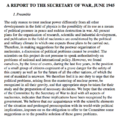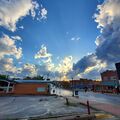Template:Selected anniversaries/June 12: Difference between revisions
Jump to navigation
Jump to search
No edit summary |
No edit summary |
||
| (20 intermediate revisions by the same user not shown) | |||
| Line 3: | Line 3: | ||
File:Paul Guldin.jpg|link=Paul Guldin (nonfiction)|1577: Astronomer and mathematician [[Paul Guldin (nonfiction)|Paul Guldin]] born. He will discover the Guldinus theorem, which determines the surface and the volume of a solid of revolution. | File:Paul Guldin.jpg|link=Paul Guldin (nonfiction)|1577: Astronomer and mathematician [[Paul Guldin (nonfiction)|Paul Guldin]] born. He will discover the Guldinus theorem, which determines the surface and the volume of a solid of revolution. | ||
||1806 | ||1806: John A. Roebling born ... engineer, designed the Brooklyn Bridge. Pic. | ||
||1812 | ||1812: Edmond Hébert born ... geologist and academic. Hébert contributed to the knowledge of the Jurassic and older strata, and made the first definite arrangement of the Chalk into palaeontological zones. Pic. | ||
||1817 | ||1817: Maiden ride by Karl von Drais of the bicycle. Pic. | ||
||Edward Troughton | ||1835: Edward Troughton dies ... instrument maker who was notable for making telescopes and other astronomical instruments. No DOB. Pic. | ||
||1843 | ||1843: David Gill born ... astronomer and author. Pic. | ||
||1851 | ||1851: Oliver Joseph Lodge born ... physicist who perfected his “coherer” to act as a radio-wave detector, the essential part of an early radiotelegraph receiver. On 14 Aug 1894, he made the first demonstration of wireless transmission of information using Morse code at a meeting of the British Association at Oxford. He transmitted a message about 150 yards from the old Clarendon Laboratory to the University Museum. He provided his laboratory facilities to conduct the first clinical use of X-rays in England (7 Feb 1896), at the request of surgeon Sir Robert Jones (1855-1933), to examine the wrist of boy who had accidentally shot himself. Lodge invented electric spark ignition, and investigated psychic phenomena with his friend Sir Arthur Conan Doyle. Pic. | ||
|| | ||1856: Hermann Ganswindt born ... inventor and spaceflight scientist, whose inventions (such as the dirigible, the helicopter, and the internal combustion engine) are thought to have been ahead of his time. Pic. | ||
|| | ||1888: Zygmunt Janiszewski born ... mathematician and academic. Pic: https://pl.wikipedia.org/wiki/Zygmunt_Janiszewski | ||
|| | ||1899: Fritz Albert Lipmann born ... biochemist and academic, Nobel Prize laureate. Pic. | ||
|| | ||1900: Robert Bigham Brode born ... physicist, who during World War II led the group at the Manhattan Project's Los Alamos laboratory that developed the fuses used in the atomic bombing of Hiroshima and Nagasaki. Pic. | ||
|| | ||1916: Silvanus P. Thompson dies ... physicist, engineer, and academic. His most enduring publication is his 1910 text ''Calculus Made Easy'', which teaches the fundamentals of infinitesimal calculus, and is in the public domain (and still in print). Pic. | ||
|| | ||1918: Mathematician, physicist, and academic Christie Jayaratnam Eliezer born. He will be a leading academic in his native Ceylon. Pic. | ||
|| | ||1920: Dave Berg born ... soldier and cartoonist. Pic (self portrait cartoon). | ||
||1922: Margherita Hack born ... astrophysicist and author. Pic. | |||
||1935: A ceasefire is negotiated between Bolivia and Paraguay, ending the Chaco War. | |||
File:Vladimir Arnold.jpg|link=Vladimir Arnold (nonfiction)|1937: Mathematician and academic [[Vladimir Arnold (nonfiction)|Vladimir Arnold]] born. He will help develop the Kolmogorov–Arnold–Moser theorem regarding the stability of integrable systems. | File:Vladimir Arnold.jpg|link=Vladimir Arnold (nonfiction)|1937: Mathematician and academic [[Vladimir Arnold (nonfiction)|Vladimir Arnold]] born. He will help develop the Kolmogorov–Arnold–Moser theorem regarding the stability of integrable systems. | ||
File: | ||1945: Theodore Hardeen dies ... magician, escape artist. Pic. | ||
File:Franck Report preamble.png|link=Franck Report (nonfiction)|1945: Physicist James Franck brings the [[Franck Report (nonfiction)|Franck Report]] to Washington. The report recommends that the United States not use the atomic bomb as a weapon to prompt the surrender of Japan in World War II. | |||
||1952: James Irvine dies ... organic chemist and Principal and Vice-Chancellor of the University of St Andrews from 1921 until his death. As a research chemist, Irvine worked on the application of methylation techniques to carbohydrates, and isolated the first methylated sugars, trimethyl and tetramethyl glucose. Pic (movie star). | |||
||1963: NAACP field secretary Medgar Evers is murdered in front of his home in Jackson, Mississippi by Ku Klux Klan member Byron De La Beckwith during the Civil Rights Movement. | |||
||1964: Anti-apartheid activist and ANC leader Nelson Mandela is sentenced to life in prison for sabotage in South Africa. | |||
||1967: The United States Supreme Court in Loving v. Virginia declares all U.S. state laws which prohibit interracial marriage to be unconstitutional. | |||
||1980: Egon Sharpe Pearson dies ... statistician. | |||
|| | ||1985: Hua Luogeng dies ... mathematician famous for his important contributions to number theory and for his role as the leader of mathematics research and education in the People's Republic of China. | ||
|| | ||2006: José Leite Lopes dies ... theoretical physicist who worked in the field of quantum field theory and particle physics. Political refugee from Brazil. Pic search. | ||
|| | ||2010: Richard Darwin Keynes dies ... physiologist who did pioneering work on the mechanisms underlying the conduction of the action potential along nerve fibres. Early in his career, he worked with the giant nerve fibers of squid, which would help discover how nerve impulses are transmitted in all animals. In later resarch, he determined how electric eels project electric fields outside their bodies. Keynes was the first to use radioactive sodium and potassium tracer atoms to follow the movements of these atoms when an impulse is transmitted along a nerve fibre. He has written extensively about the life and work of his great-grandfather, Charles Darwin, beginning with The Beagle Record (1979). Pic not Wikipedia. | ||
|| | ||2012: Henry Hill dies ... mobster. | ||
|| | ||2014: Richard Lewis Arnowitt dies ... physicist known for his contributions to theoretical particle physics and to general relativity. Pic. | ||
|| | ||2015: Pierre Dolbeault dies ... mathematician. He is known for Dolbeault cohomology and the Dolbeault theorem. Pic. | ||
|| | File:Evening (12 June 2024) 20240612_200658.jpg|link=Evening (12 June 2024)|2024: '''[[Evening (12 June 2024)|Evening]]'''. | ||
</gallery> | </gallery> | ||
Latest revision as of 18:26, 12 June 2024
1577: Astronomer and mathematician Paul Guldin born. He will discover the Guldinus theorem, which determines the surface and the volume of a solid of revolution.
1937: Mathematician and academic Vladimir Arnold born. He will help develop the Kolmogorov–Arnold–Moser theorem regarding the stability of integrable systems.
1945: Physicist James Franck brings the Franck Report to Washington. The report recommends that the United States not use the atomic bomb as a weapon to prompt the surrender of Japan in World War II.
2024: Evening.



